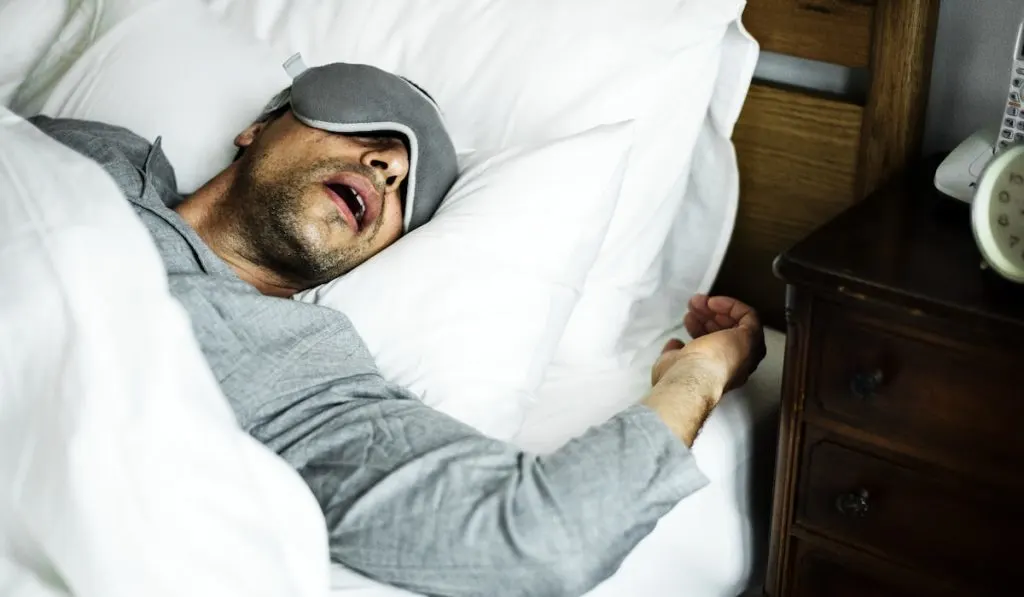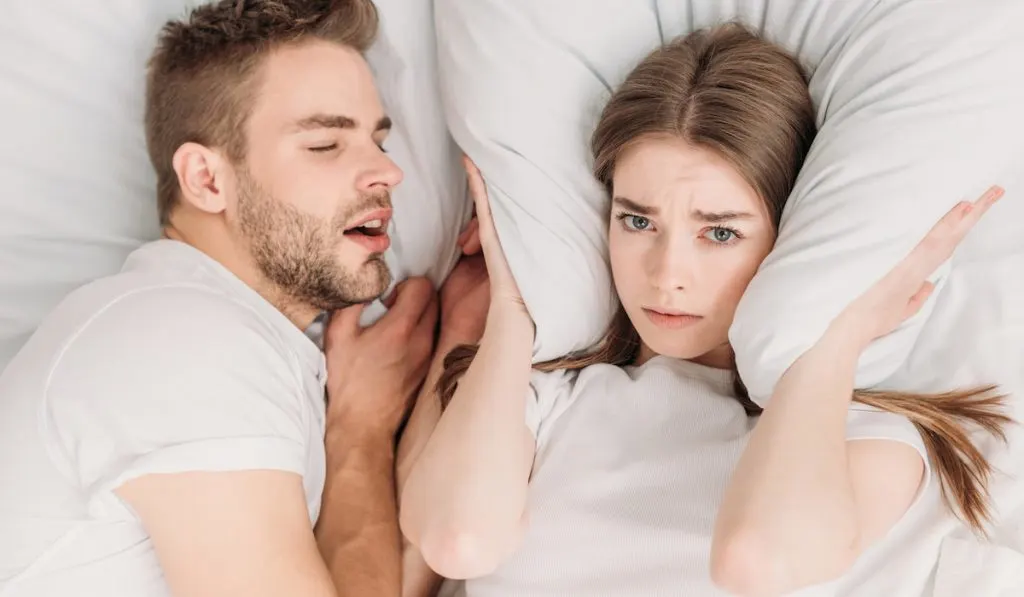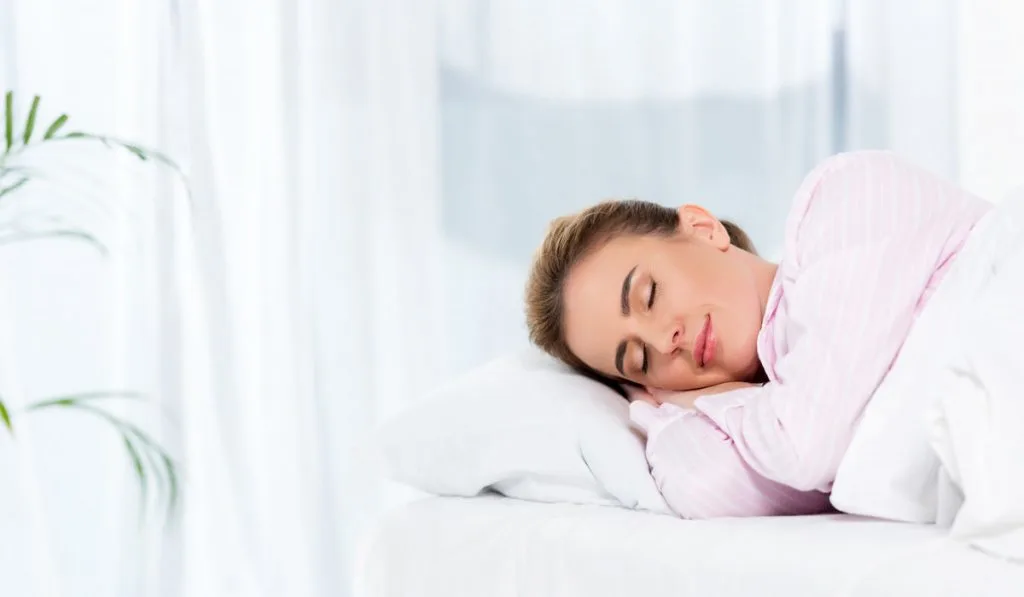Can we snore and dream at the same time? While there isn’t any definitive evidence, most theories say we can’t snore and dream at the same time because they occur in different stages of sleep. People are split into two camps: YES and NO.
In my research, I found that there are mixed answers about whether you can snore and dream at the same time. It seems there’s no consensus on this answer because there isn’t scientific evidence that supports either theory.
Let’s look at the various pieces of evidence that exist. You can decide what the answer is once you’ve read all the facts.

Theories About Snoring and Dreaming at the Same Time
People with chronic snoring issues or sleep apnea often claim they wake up from dreams because of their snoring. They contribute the most to the theory that you can snore and dream at the same time.
Sleep apnea doesn’t have much to do with weak or soft tissues in your neck. You snore all night regardless of whether your body is relaxed or at night. People with sleep apnea even snore during REM sleep cycles.
Some also argue that dreaming can happen in other stages of sleep. The same ones that snoring occurs. For this reason, many believe you can snore and dream at the same time.
People also believe that snoring and dreaming operate in different areas of the body and don’t influence one another.
They say snoring is a reaction to blocked airways, and dreams happen because of electrochemical reactions in grey matter near the back of the brain.
This is, of course, theoretical. Most beliefs about snoring and dreaming at the same time don’t have facts to back them.
Why do we snore?
We should understand why and when we snore to help answer this question. Most people feel embarrassed that they snore. Let’s be honest it can be frustrating to hear the whole house vibrating with the sounds.
Snoring is more common than you think. About 50% of the U.S. adult population snores (primary snorers), and almost everyone does it sometimes (simple snorers).
Men snore more than women. The stats are around 45% and 30% respectively.
There usually isn’t something to worry about, but snoring can cause concern in certain situations.
You should see a doctor if you snore, wake up struggling for breath, and rarely feel rested after a night’s rest. It might be a sign of Obstructive Sleep Apnea.
The process of snoring begins when the soft tissue in your neck relaxes as you fall asleep. Your airways become constricted while you’re breathing. The tissue in your throat begins to vibrate and produce that dreaded sound.
People believe you can’t snore and dream at the same time because snoring doesn’t happen in REM sleep as dreams do. We snore during the other stages of sleep when dreaming isn’t likely to happen.
Most people who snore have exceptionally soft tissue in their throat and nasal passages. It’s almost like a floppy doll. Sometimes a person has too much of the surrounding tissue, which restricts the airways and causes snoring.

Causes of Snoring
Many other factors might make a person snore. That is why everyone in the world snores on occasion. The best sleep position to prevent snoring is lying on your side. The worst is lying on your back.
Here are some of the other reasons that cause snoring:
- Swollen or large tonsils
- Allergies
- Muscle relaxants
- The uvula (the dangling thing at the back of your mouth) sometimes becomes enlarged.
- Aging
- Having the flu or other respiratory infections
- Various sleep disorders
- Excess alcohol consumption
- Excess weight
- Smoking
- Rooms with poor ventilation and lots of dust
- A deviated septum, which is the thin membrane between your nostrils.
- Sleep deprivation
There are ways to solve some snoring issues without getting a separate room.
Of course, you must discuss snoring with your doctor so that they can evaluate whether or not intervention is needed.
Remedies to Alleviate Snoring
Snoring can be disruptive to your sleep and those around you. These solutions can help you get the sleep you deserve.
- A quick fix is to change positions. Lying on your back is more likely to cause snoring than sleeping on your side.
- Avoid drinking alcohol every day. If you like having a drink every day, try not to have one a few hours before bed.
- Develop a good, healthy sleeping routine to improve the quality of your sleep.
- Keep your nasal passages clear by blowing your nose or using a nasal spray to dry up excess mucus.
- Change your linen and get new pillows.
- Keep well hydrated before bed.
Snoring vs. Sleep Apnea
Snoring and Obstructive Sleep Apnea disrupts your sleep, but one has more consequences than the other.
Simple snoring is usually caused by a factor that’s easy to solve, like rolling over onto your side.
With Obstructive Sleep Apnea, snoring is usually a symptom. You typically stop breathing because your airways are exceptionally blocked or collapsed. Once that happens, you choke and gasp for breath.
Sleep apnea causes you to wake up multiple times in a night, sometimes without even realizing it. You wake up tired and unrested.
You must see a doctor if you suspect you or someone close to you is suffering from sleep apnea.

Why Do We Dream?
Dreams combine visual and emotional stimuli that you received throughout the day and transform them into crazy stories that can last anywhere from five to 20 minutes.
They are sometimes hilarious or exhilarating. Other times our dreams are so scary we question what’s going on with us.
There is no definitive reason as to why we dream. Some scientists believe it’s the way our brains process information from the day. Others think it’s just chemical impulses that happen when we sleep.
There is much debate around the philosophic and scientific reasonings for dreams. The three beliefs are:
- They only happen because of psychological stimulations and mean nothing.
- They are psychologically necessary and help us process the emotions we experience each day.
- They are prophetic and should be analyzed for meaning.
There isn’t a best position for dreaming, but some scientists believe different positions influence your dreams.
Some research shows that sleeping on your right-side creates more positive dreams than sleeping on your left.
There is research that suggests sleeping on your stomach leads to erotic dreams, but most doctors recomend you don’t sleep in this position.
Whatever the reason, dreaming happens during the REM cycle of sleep. Most people believe that’s the reason we can’t snore and dream at the same time.
Stages and Mechanisms of Sleep
Rapid Eye Movement (REM) and non-REM make up the bulk of your sleeping cycle. Non-REM sleep is split into four sub-groups with different brain activity in each stage.
To better answer the question of whether we can snore and dream at the same time, we must understand the stages of sleep.
Stage One
Stage one is when you sleep the lightest. It’s that moment when you start to fall asleep. Sometimes you wake with fright because you literally start feeling yourself falling into sleep.
In this stage, your brain waves and bodily functions begin to slow. All your muscles relax. You might twitch here and there, but you’re usually quite still.
Stage Two
In this stage, you begin to relax into a deeper sleep. The body has stopped twitching, and your eyes have stopped moving.
Your body temperature also begins to lower in stage two. Brain activity slows, but occasional activity flares up.
Your sleep consists of multiple-stage two cycles. You may start snoring at this stage of sleep.
Stage Three
Stage three is your deepest and most necessary stage of sleep. It is where you get fully rested, so you can wake up feeling refreshed.
They last longer during the first part of your sleep. Your bodily functions, like breathing and heart rate, are lowest during this stage of sleep. Brain waves are slow.
Your body becomes so relaxed that you may start snoring at this stage.
REM Sleep
REM sleep starts in the first 90-minutes of sleeping. Your eyes rapidly move, hence the name, and your brain activity looks similar to when you’re awake.
All your bodily functions are heightened. Your breathing and heartbeat are faster. You don’t move as much as you might expect because your body is almost paralyzed at this stage. It’s a way to protect you from climbing out of bed during dreaming.
Most dreaming occurs during REM sleep. Although, you can dream in other sleep stages, too. That is why some people believe you can snore and dream at the same time.

Two Mechanisms of Sleep
Two crucial mechanisms help us sleep.
Circadian Rhythms
These help us with more than just sleep. Circadian rhythms operate a variety of bodily functions while awake and asleep.
Circadian rhythms control your sleeping patterns and make you sleepy when it’s time for bed. Your biological clock governs these rhythms. They sync with other factors like when daylight starts to disappear.
Homeostasis
Sleep homeostasis is an automatic system that tracks when you need sleep. You will sleep for more hours when sleep deprived because of this function.
Snoring and unusual work hours can disrupt these mechanisms of sleep. You stop getting the rest you need and become lethargic and irritable.
Final Thoughts
The evidence on whether we can snore and dream at the same time isn’t clear cut. Snoring and dreaming occur during different stages of sleep, so it’s unlikely you’ll do it at the same time.
Some claim that sleep apnea and other snoring disorders happen regardless of the sleep cycle you’re in, so you can snore and dream simultaneously.
They also claim that you can snore during REM sleep and even dream in other stages of sleep. Of course, none of this is backed by scientific evidence.
This answer isn’t straightforward. From the evidence above, you can decide your answer.
Resources
- https://goodsomnia.com/blog/snoring-sleep-apnea/can-you-snore-and-dream-at-the-same-time/
- https://www.snoringsource.com/can-you-snore-and-dream/
- https://www.infobarrel.com/can_you_snore_and_dream_at_the_same_time
- https://science.howstuffworks.com/life/inside-the-mind/human-brain/dream3.htm
- https://www.helpguide.org/articles/sleep/snoring-tips-to-help-you-and-your-partner-sleep-better.htm
- https://www.webmd.com/sleep-disorders/features/easy-snoring-remedies
- https://telanganatoday.com/can-you-snore-while-dreaming
- https://healthtalk.unchealthcare.org/snoring-vs-sleep-apnea-is-there-a-difference/
- https://www.sleepapnea.org/learn/sleep-apnea/do-i-have-sleep-apnea/is-it-snoring-or-sleep-apnea/
- https://www.premierhealth.com/your-health/articles/women-wisdom-wellness-/a-simple-snore-or-something-more-sleep-apnea-and-snoring
- https://www.ninds.nih.gov/Disorders/Patient-Caregiver-Education/Understanding-Sleep
- https://www.everydayhealth.com/sleep/can-changing-your-sleep-position-alter-your-dreams
